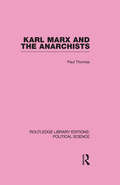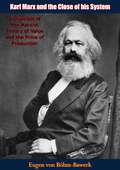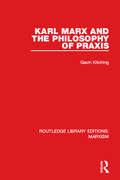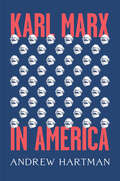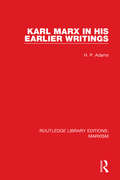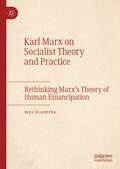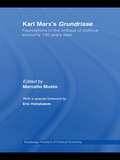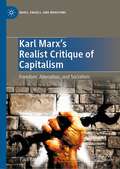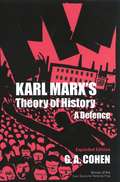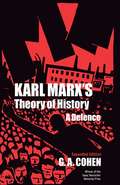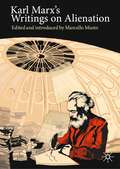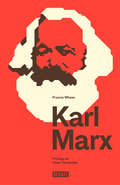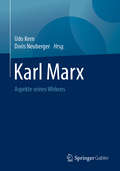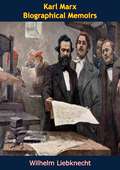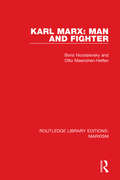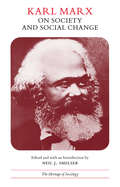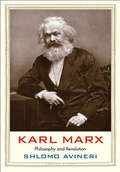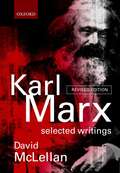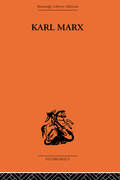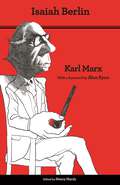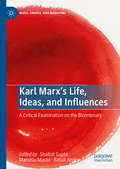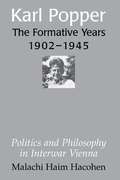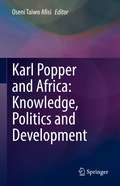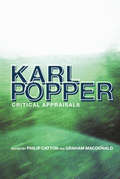- Table View
- List View
Karl Marx and the Anarchists Library Editions: Political Science Volume 60
by Paul ThomasThis study examines Marx’s disputes with, and attacks upon, those anarchist theoreticians he encountered at various stages of his career. Marx’s attacks on Stirner, Proudhon and Bakunin are shown to be of vital importance to his career as a theorist and revolutionist. The formative influences upon Marx’s writings and his political activity are discussed and analyzed. The author re-situates Marx’s thought in the context of the 19th century when Marxism was not an unchallenged orthodoxy but a doctrine and method that needed to be defended against rival revolutionary impulses.
Karl Marx and the Close of his System: A Criticism of the Marxist Theory of Value and the Price of Production
by Eugen von Böhm-BawerkEugen Von Böhm-Bawerk, economist of the Austrian school, wrote this incisive critique of Marxist economics amid rising public support for socialism, communism and state-controlled markets in Europe.Published in 1896, this work criticizes Marxist theory from two angles: firstly, that the notion of value which Marx puts forward contradict his own ideas. The author asserts that the link between the price of producing goods and the value produced by labor are not consistently dealt with in Marx’s works. This inconsistency in assigning value to economic production leads onto the second critique:Supply and demand is a theory whereby an equilibrium between goods supplied to a market and goods demanded by consumers in said market is established, with changes in the quantity or price of a good being in reaction to demand. Böhm-Bawerk discusses how Marx underestimates this law, and how his lack of appreciation for an economy which flexibly meets the shifting demands of consumers undermines his notions of price and value. From the perspective of a free market capitalist, Marxist theory is inadequate and insufficient as a system of economics.-Print ed.
Karl Marx and the Philosophy of Praxis (Routledge Library Editions: Marxism #6)
by Gavin KitchingIn this major study, first published in 1988, Professor Kitching builds on recent scholarship on Marx and Wittgenstein to provide an incisive, readable account and critique of the whole of Marx’s work. He presents the philosophical, economic, and political Marx as one thinker, and argues that the key to understanding Marx is his commitment to a ‘philosophy of praxis’. This sees thought as just part of that purposive activity (or praxis) which distinguishes human beings from other creatures. This is the first book to analyse all of Marx’s thought from a Wittgenstein perspective; in doing so, it clarifies and deepens our understanding of Marx.
Karl Marx in America
by Andrew HartmanThe vital and untold story of Karl Marx’s stamp on American life. To read Karl Marx is to contemplate a world created by capitalism. People have long viewed the United States as the quintessential anti-Marxist nation, but Marx’s ideas have inspired a wide range of people to formulate a more precise sense of the stakes of the American project. Historians have highlighted the imprint made on the United States by Enlightenment thinkers such as Adam Smith, John Locke, and Thomas Paine, but Marx is rarely considered alongside these figures. Yet his ideas are the most relevant today because of capitalism’s centrality to American life. In Karl Marx in America, historian Andrew Hartman argues that even though Karl Marx never visited America, the country has been infused, shaped, and transformed by him. Since the beginning of the Civil War, Marx has been a specter in the American machine. During the Gilded Age, socialists read Marx as an antidote to the unchecked power of corporations. In the Great Depression, communists turned to Marx in hopes of transcending the destructive capitalist economy. The young activists of the 1960s were inspired by Marx as they gathered to protest an overseas war. Marx’s influence today is evident, too, as Americans have become increasingly attuned to issues of inequality, labor, and power. After decades of being pushed to the far-left corner of intellectual thought, Marx’s ideologies have crossed over into the mainstream and are more alive than ever. Working-class consciousness is on the rise, and, as Marx argued, the future of a capitalist society rests in the hands of the people who work at the point of production. A valuable resource for anyone interested in Marx’s influence on American political discourse, Karl Marx in America is a thought-provoking account of the past, present, and future of his philosophies in American society.
Karl Marx in his Earlier Writings (Routledge Library Editions: Marxism #7)
by H.P. AdamsThis book, originally published in 1940, is primarily intended to tell the English reader what is contained in the earlier works of Marx, with emphasis on what seemed to throw most light on the man and his systematic thought. As such, it is an invaluable contribution to the study of Marx and Marxism.
Karl Marx on Socialist Theory and Practice: Rethinking Marx’s Theory of Human Emancipation
by Wei XiaopingThis book discusses Marx’s thinking on human emancipation based on his critique of capitalism and the prospect of socialism. It analyzes the double relations between persons and things, and persons and persons by tracking Marx’s writings, including MEGA2, and taking into consideration the socialist practice and socialist reform of the last century. It is a necessary study for social scientists, social andpolitical philosophers, and students for its deep and wide analysis from the perspective of Marxian theory in practice.
Karl Marx's Grundrisse: Foundations of the critique of political economy 150 years later (Routledge Frontiers Of Political Economy Ser.)
by Marcello MustoWritten between 1857 and 1858, the Grundrisse is the first draft of Marx‘s critique of political economy and, thus, also the initial preparatory work on Capital. Despite its editorial vicissitudes and late publication, Grundrisse contains numerous reflections on matters that Marx did not develop elsewhere in his oeuvre and is therefore extremely im
Karl Marx's Realist Critique of Capitalism: Freedom, Alienation, and Socialism (Marx, Engels, and Marxisms)
by Paul RaekstadThis book offers the first realist reconstruction of Marx’s critique of capitalism. Reading Marx through a realist lens enables us to make sense of the connections between (1) Marx’s positive concept of freedom, rooted in a theory of human development, (2) his understanding of alienation as diagnosing capitalist unfreedom, and (3) his conceptions of democracy and socialism, respectively, as the cures for this unfreedom. Along the way, it discusses and responds to some of Marx’s most insightful critics, such as Max Weber and Friedrich Hayek. This clarifies Marx’s ideas for a new generation of political thinkers; explains the challenge they pose to contemporary debates about freedom, democracy, and future economic institutions; and demonstrates that these ideas remain both defensible and compelling.
Karl Marx's Theory of History: A Defence
by G. A. CohenFirst published in 1978, this book rapidly established itself as a classic of modern Marxism. Cohen's masterful application of advanced philosophical techniques in an uncompromising defense of historical materialism commanded widespread admiration. In the ensuing twenty years, the book has served as a flagship of a powerful intellectual movement--analytical Marxism. In this expanded edition, Cohen offers his own account of the history, and the further promise, of analytical Marxism. He also expresses reservations about traditional historical materialism, in the light of which he reconstructs the theory, and he studies the implications for historical materialism of the demise of the Soviet Union.
Karl Marx's Theory of History: A Defence (Expanded Edition)
by G. A. CohenFirst published in 1978, this book rapidly established itself as a classic of modern Marxism. Cohen's masterful application of advanced philosophical techniques in an uncompromising defense of historical materialism commanded widespread admiration. In the ensuing twenty years, the book has served as a flagship of a powerful intellectual movement--analytical Marxism. In this expanded edition, Cohen offers his own account of the history, and the further promise, of analytical Marxism. He also expresses reservations about traditional historical materialism, in the light of which he reconstructs the theory, and he studies the implications for historical materialism of the demise of the Soviet Union.
Karl Marx's Writings on Alienation (Marx, Engels, and Marxisms)
by Marcello MustoThe theory of alienation occupies a significant place in the work of Marx and has long been considered one of his main contributions to the critique of bourgeois society. Many authors who have written on this concept over the 20th century have erroneously based their interpretations on Marx’s early writings. In this anthology, by contrast, Marcello Musto has concentrated his selection on the most relevant pages of Marx’s later economic works, in which his thoughts on alienation were far more extensive and detailed than those of the early philosophical manuscripts. Additionally, the writings collated in this volume are unique in their presentation of not only Marx’s critique of capitalism, but also his description of communist society. This comprehensive rediscovery of Marx’s ideas on alienation provides an indispensable critical tool for both understanding the past and the critique of contemporary society.
Karl Marx: A Life
by Francis WheenIn this first comprehensive biography of Marx since the end of the Cold War, Wheen delivers not a socialist ogre but a fascinating, ultimately humane man, while still examining the criticisms of his detractors. of photos.
Karl Marx: Aspekte seines Wirkens
by Udo Kern Doris NeubergerUm die heutige Welt zu begreifen, sollten wir uns nach Präsident Macron mit dem Werk „Das Kapital“ von Marx beschäftigen. Tatsächlich stellt sich nach der Finanzkrise 2007/2008 und nach Karl Marx' 200. Geburtstag im Jahr 2018 die Frage, wie aktuell sein Werk auch oder vielleicht gerade heute noch ist. In diesem Fachbuch werden deshalb verschiedene Aspekte aus dem Leben und Werk von Karl Marx beleuchtet. Dabei verfolgen die Autoren, Forscher der Universität Rostock, einen interdisziplinären Ansatz und behandeln sowohl Marx' Religionskritik als auch die Frage nach seinem politischen Denken. Thematisiert werden Marx' Interpretationen von Kapital und Geld sowie sein Kommunismusverständnis und sein Kapitalverstehen. War Karl Marx ein politischer Denker? Kann Karl Marx die Finanzkrise 2007/08 erklären und wenn ja, vielleicht sogar besser als der ökonomische Mainstream? Welchen Stellenwert kann seiner Philosophie und seiner Geld- und Kredittheorie beigemessen werden? Stimmen Kernaussagen seiner Kapitalismuskritik? In sechs Kapiteln, die auch unabhängig voneinander gelesen werden können, gehen die Autoren eingehend auf diese Fragen und Themen ein.
Karl Marx: Biographical Memoirs
by Wilhelm LiebknechtWilhelm Liebknecht, (born March 29, 1826, Giessen, Hesse [Germany]—died Aug. 7, 1900, Berlin), German socialist, close associate of Karl Marx, and later cofounder of the German Social Democratic Party. In this brief but fascinating account, Liebknecht relates his involvement with Karl Marx, mainly during his exile in England.
Karl Marx: His Life and Work (Routledge Revivals)
by Otto RühleFirst published in English in 1929, this is a reissue of Otto Rühle's comprehensive biography of Karl Marx. Written by a leading Marxist and key figure within the German Labour movement, this is an exceptionally detailed and well-researched study which sets Marx's life and work firmly within its social and historical context before examining in depth the major events of his life and the writings for which he has become such an influential figure in modern political philosophy. The final chapter offers an appraisal of both the man and his work, as Rühle summarises why he believes Marx was a genius.
Karl Marx: Man and Fighter (Routledge Library Editions: Marxism #8)
by Boris Nicolaievsky Otto Maenchen-HelfenStrife has raged about Karl Marx for decades, and never had it been so embittered as at the time of this book’s first publication, 1936. Marx had impressed his image on the time as not other had done. To some he was – and still is – a fiend, the arch-enemy of human civilisation, and the prince of chaos, while to others he is a far-seeing and beloved leader, guiding the human race towards a brighter future. The arena in which Marx was fought about in 1936 was in the factories, in the parliaments and at the barricades. In both camps, the bourgeois and the socialist, Marx was first of all, if not exclusively, the revolutionary. This book sets out to describe the life of Marx the fighter.
Karl Marx: On Society and Social Change
by Karl Marx Neil J. SmelserThis volume presents those writings of Marx that best reveal his contribution to sociology, particularly to the theory of society and social change. The editor, Neil J. Smelser, has divided these selections into three topical sections and has also included works by Friedrich Engels. The first section, "The Structure of Society," contains Marx's writings on the material basis of classes, the basis of the state, and the basis of the family. Among the writings included in this section are Marx's well-known summary from the Preface of A Contribution to a Critique of Political Economy and his equally famous observations on the functional significance of religion in relation to politics. The second section is titled "The Sweep of Historical Change. " The first selection here contains Marx's first statement of the main precapitalist forms of production. The second selection focuses on capitalism, its contradictions, and its impending destruction. Two brief final selections treat the nature of communism, particularly its freedom from the kinds of contradictions that have plagued all earlier forms of societies. The last section, "The Mechanisms of Change," reproduces several parts of Marx's analysis of the mechanisms by which contradictions develop in capitalism and generate group conflicts. Included is an analysis of competition and its effects on the various classes, a discussion of economic crises and their effects on workers, and Marx's presentation of the historical specifics of the class struggle. In his comprehensive Introduction to the selections, Professor Smelser provides a biography of Marx, indentifies the various intellectual traditions which formed the background for Marx's writings, and discusses the selections which follow. The editor describes Marx's conception of society as a social system, the differences between functionalism and Marx's theories, and the dynamics of economic and political change as analyzed by Marx.
Karl Marx: Philosophy and Revolution (Jewish Lives)
by Shlomo AvineriThis new exploration of Marx as a Jewish thinker presents “a perceptive and fair-minded corrective to superficial treatments” of his life and work (Jonathan Rose, Wall Street Journal).A philosopher, historian, sociologist, economist, current affairs journalist, and editor, Karl Marx was one of the most influential and revolutionary thinkers of modern history. But he is rarely thought of as a Jewish thinker, and his Jewish background is either overlooked or misrepresented. Here, distinguished scholar Shlomo Avineri argues that Marx’s Jewish origins made a significant impression on his work. Marx was born in Trier, then part of Prussia, and his family had enjoyed full emancipation under earlier French control of the area. But then its annexation to Prussia deprived the Jewish population of its equal rights. These developments led to the reluctant conversion of Marx’s father, and similar tribulations radicalized many other Jewish intellectuals of that time.Avineri puts Marx’s Jewish background in its proper and balanced perspective, and traces Marx’s intellectual development in light of the historical, intellectual, and political contexts in which he lived.
Karl Marx: Selected Writings
by Karl Marx David McLellanThis second edition of McLellan's comprehensive selection of Marx's writings includes carefully selected extracts from the whole range of Marx's political, philosophical, and economic thought. Each section of the book deals with a different period of Marx's life, allowing readers to trace the development of his thought from his early years as a student and political journalist in Germany up through the final letters he wrote in the early 1880s. A fully updated editorial introduction and bibliography has been included for each extract in this new edition.
Karl Marx: The Story Of His Life (Routledge Library Editions)
by Franz MehringContaining footnotes and an extensive bibliography, this edition of Franz Mehring's classic biography is designed to assist the English-speaking reader towards a better understanding of Marx, his work and a history of Marxism. The book is divided into parts as follows: Early Years; A Pupil of Hegel; Exile in Paris; Friedrich Engels; Exile in Brussels; Revolution and Counter-Revolution; Exile in London; Marx and Engels; The Crimean War and the Crisis; Dynastic Changes; The Early Years of the International; 'Das Kapital'; The Zenith and Decline of the International; The Last Decade.
Karl Marx: Thoroughly Revised Fifth Edition
by Isaiah BerlinIsaiah Berlin's intellectual biography of Karl Marx has long been recognized as one of the best concise accounts of the life and thought of the man who had, in Berlin's words, a more "direct, deliberate, and powerful" influence on mankind than any other nineteenth-century thinker. A brilliantly lucid work of synthesis and exposition, the book introduces Marx's ideas and sets them in their context, explains why they were revolutionary in political and intellectual terms, and paints a memorable portrait of Marx's dramatic life and outsized personality. Berlin takes readers through Marx's years of adolescent rebellion and post-university communist agitation, the personal high point of the 1848 revolutions, and his later years of exile, political frustration, and intellectual effort. Critical yet sympathetic, Berlin's account illuminates a life without reproducing a legend. New features of this thoroughly revised edition include references for Berlin's quotations and allusions, Terrell Carver's assessment of the distinctiveness of Berlin's book, and a revised guide to further reading.
Karl Marx’s Life, Ideas, and Influences: A Critical Examination on the Bicentenary (Marx, Engels, and Marxisms)
by Marcello Musto Shaibal Gupta Babak AminiSince the latest crisis of capitalism broke out in 2008, Marx has been back in fashion, and sometimes it seems that his ideas have never been as topical, or as commanding of respect and interest, as they are today. This edited collection arises from one of the largest international conferences dedicated to the bicentenary of Marx’s birth. The volume contains 16 chapters authored by globally renowned scholars and is divided into two parts: I) On the Critique of Politics; II) On the Critique of Political Economy. These contributions, from multiple academic disciplines, offer diverse perspectives on why Marx is still so relevant for our times and make this book a source of great appeal for both expert scholars of Marx as well as students and general readers who are approaching his theories for the first time.
Karl Popper - The Formative Years, 1902-1945 Politics and Philosophy in Interwar Vienna
by Malachi Haim HacohenThis intellectual biography recovers the legacy of Karl Popper (1902-1994), the progressive, cosmopolitan, Viennese socialist who combated fascism, revolutionized the philosophy of science, and envisioned the Open Society.
Karl Popper and Africa: Knowledge, Politics and Development
by Oseni Taiwo AfisiThis book provides a diverse contextualization of Popper’s critical rationalism concerning knowledge and his generalized attitude of criticism on appropriate social and political reforms in contemporary Africa. The book evaluates how best to address contemporary political problems, especially in politically very troubled parts of the world. To address these contemporary problems, especially as it relates to Africa, the authors found the political philosophy of Popper as suitable. The discussion of Popper’s political philosophy engages us directly with all the particularities of socio-economic and political problems within contemporary Africa. In other words, it presents the truth of the present socio-political reality in Africa where the question of what kinds of political ideas and concepts can be offered as appropriate to a political environment, which so greatly faces facets of developmental issues. Although the issues and events that informed the writings of Popper’s The Poverty of Historicism as well as The Open Society and Its Enemies, were among others, the rise of fascism and communism in Europe, the inventiveness of this work is how happily scholars in non-liberal societies, such as in Africa, can pick up Popper’s insights and usefully work with them to offer appropriate social reforms for their society. This volume is a critical juxtaposition of Popper’s ideas in a bid to make good sense of social and intellectual conditions in Africa, particularly as it relates to the scale and speed of social change that is needed in most African nations that are often ridden by corruption. The book is suitable for studies in political philosophy, economic and development studies, African Studies and Indigenous Knowledge systems.
Karl Popper: Critical Appraisals
by Philip Catton Graham MacdonaldOne of the most original thinkers of the century, Karl Popper has inspired generations of philosophers, historians, and politicians. This collection of papers, specially written for this volume, offers fresh philosophical examination of key themes in Popper's philosophy, including philosophy of knowledge, science and political philosophy. Drawing from some of Popper's most important works, contributors address his solution to the problem of induction, his views on conventionalism and criticism in an open society, and his unique position in 20th century philosophy. They also examine the current relevance of Popper to understanding liberal democracy, his critique of tribalism and his relationship with analytic philosophy in general - and with Wittgenstein in particular - as well as drawing on the studies of Isaac Newton and Albert Einstein to assess Popper's conception of science.
